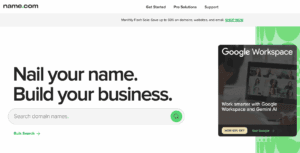Domain Name Investing: Invest in Premium Domain Names
There’s more to a premium domain name than a high price tag – a great one can accelerate business growth and promote long-term financial stability. NameExperts.com Director Joe Uddeme explains why landing a beauty could be essential for your company. Here’s a question for every company to tackle. Small businesses and startups in particular need to consider if it is worth investing a quarter of their funding, say, on a premium domain name rather than better office facilities or company cars. The answer to that question is seldom simple. That’s because it is dependent on the kind of business the domain name will be used by, together with a number of other aspects. A domain name is critical because, quite simply, you can’t run a website without one. It will be the title of your site and email – and will play a crucial role in your marketing strategy once you’ve purchased it. In this guide, we’ll study everything there is to know about premium domain names so you can decide whether you should buy one for your business. Even if the name you want ends up costing $10,000 or more (LOTS more, in some cases), it might prove to be one of the best investments you make for your company. When is a Domain Name Considered a Premium Domain? The process of buying domain names usually involves several disappointing moments. Such as when you first think of an especially excellent name… only to search for it and discover it was bought in 1999 and is currently up for sale for $100k. The crazy thing is, these domains do nothing special. There’s no rocket science involved with coming up with them – which is kind of the point. Premium domain names with a high price tag are familiar-sounding and catchy. Everyday words. It’s why cars.com sold for almost a billion dollars. A great domain name will help your site gain more traction much faster – and will prove to be one of your greatest investments if you have chosen wisely. This is the reason why a domain becomes a premium one. The Precise Definition of a Domain Name The cost of a domain name will give away that it’s a premium one. Usually, a regular premium domain name is a domain name that is already owned by a registry or a person. If you want it, it’ll cost you. The name’s costs are exponentially higher than a typical domain and can vary from a few hundred dollars to millions. This is because of the perceived value which it might have for a company within a particular industry. In order for a name to achieve a high sale price, there has to be somebody who believes it is worth it. Until a domain name is sold, technically speaking it is worth virtually nothing. Try getting a million bucks for a domain name if the internet permanently goes down! A domain name is considered premium due to its brandability, keywords and overall desirability. All these are highly valuable for a business that wishes to branch out on the internet. Not every premium domain price is set by a person. On occasion, the relevant registry (such as .info or .design) sets the cost for this. The Potential Problems With Choosing a Not-So-Premium Domain There are a few issues a company might run into if they don’t choose the best domain name they can. Here are the main difficulties: Trust and Branding Issues. Often, having a .com domain is the best way to show that a company is serious and trustworthy. A good deal of experts say to always go with .com, but there are lots of other options too, including .org, .co and .io. A trusted domain name consultant can guide you on the best choices here. Little Potential to Grow. When you’re stuck with a lemon, you can limit your business opportunities. Numerous businesses end up thriving after purchasing a premium domain name for around $500,000, particularly if it matches with their institution’s name. It Might Confuse the Client. If a business opts for an inferior domain extension, they may lose lots of customers. Some of these would-be visitors might believe the support is down or that the site doesn’t even exist because what they have actually done is visit domain.com rather than your site – domain.co. How a Premium Domain Name Can Help Your Website The fantastic thing about ultra-premium domain names is the fact that they are pretty much household names – so you don’t have to make additional investments in making them known. As a result: You’ll have to spend less money on internet PPC advertisements. Why? Because you are going to get organic visitors to your website as soon as you’ve launched it. You’ll enjoy better SEO and site rank – resulting in more traffic. Individuals are already searching for your website and will be glad to find it. There are more trust and authority involved using a premium domain name, which will make reliable companies link to your site. This can further boost SEO. A short, catchy name functions really well on social media and people will remember it. The domain will provide prospective clients with a strong indication about what they will find on your website, so you don’t have to invest money and time describing it to them. Simply speaking, it is much simpler to make a premium domain popular. You’ll have to devote a good deal less money on advertising it. Summing up If you’re doing business in a market where word of mouth is essential, than premium domains are definitely something to consider – whatever the cost. Not all small business owners and startups, however, should start with a premium domain name. A business can definitely be effective with a less-than-perfect domain name if it is catchy enough. If the domain name you’re considering matches your branding, sometimes that is all you’ll need. It can work well even if it doesn’t match your business’s name. If you can’t get the .com extension you want, it is possible to go with .co, .ai or many other top-level domains (TLDs). But when you start to hit it big, securing a premium domain name could be a very wise move – because there’s a high possibility it will pay off handsomely within the next few years. About the author Joe Uddeme is Director and Principal of Name Experts, one of the world’s leading domain name brokerage services. He has overseen domain name sales and acquisitions totaling more than $150 million and is renowned worldwide as a go-to expert in buying and selling premium domains. Contact us at: [email protected]







